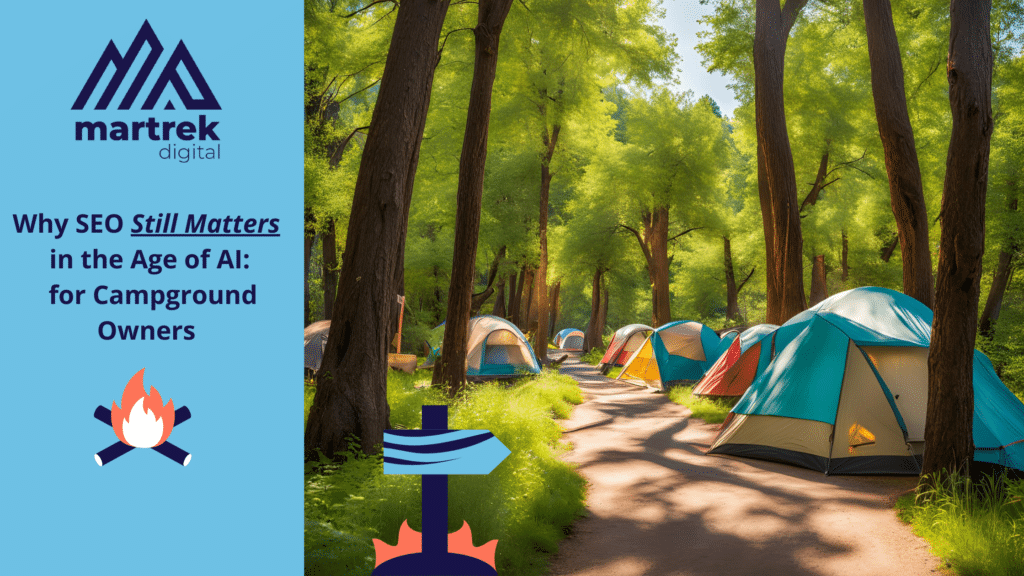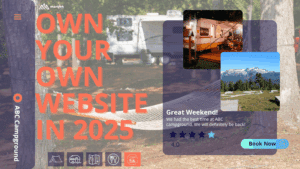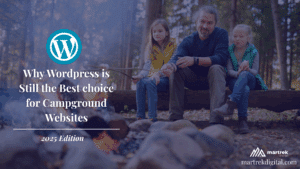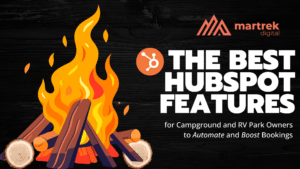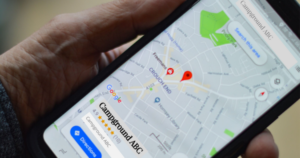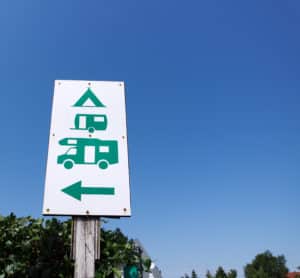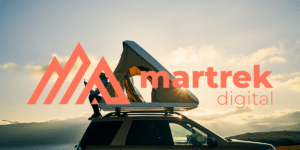Why SEO Still Matters in the Age of AI for Campground Owners
In the ever-evolving digital landscape, artificial intelligence (AI) has taken center stage, offering tools to simplify marketing efforts. But does that mean we can abandon traditional strategies like search engine optimization (SEO)? For campground owners and operators, the answer is a resounding no. SEO still matters and remains critical to attracting campers, filling sites, and driving bookings, even as AI tools become more prevalent. Here’s why SEO still matters and how it complements, rather than competes with, AI.
The Enduring Power of SEO
SEO has been a cornerstone of digital marketing for decades. Its principles—like optimizing websites for search engines, researching keywords, and building authoritative backlinks—have stood the test of time. While AI can help generate ideas and streamline some processes, it cannot replicate the strategic foundation of SEO. Search engines like Google are constantly evolving, prioritizing user experience, relevance, and intent. Staying visible requires campground owners to keep their SEO strategies sharp.
AI Complements, Not Replaces, SEO
AI tools, such as content generators and chatbots, are great for improving efficiency and offering suggestions. For example, AI can create an outline for a blog about family camping trips. However, the content’s effectiveness still depends on well-researched keywords, local SEO optimization, and strategic placement of calls-to-action (CTAs). SEO still matters here as it ensures that your content, even if AI-assisted, actually reaches your audience when they search for terms like “pet-friendly campgrounds near Yellowstone.”
Google Listings – Your Campground’s First Impression
When prospective campers search for a campground, the first thing they often see is your Google Business Profile. A fully optimized listing is a vital part of your SEO strategy and is something AI cannot handle on its own. Campground owners can make their Google Listings stand out by:
- Uploading high-quality photos of tent sites, RV spots, or glamping cabins.
- Including detailed descriptions of amenities, like Wi-Fi, laundry, and playgrounds.
- Keeping hours, prices, and contact details accurate, especially during the off-season.
We have 3 easy steps for you to manage your profile and your listing, here.
For more details, visit the Google Business Profile Support Page.
Local SEO – A Game-Changer for Campgrounds
Local SEO is essential for campgrounds, as travelers often search for “campgrounds near me” or “RV parks in [location].” Appearing at the top of these searches can significantly impact your bookings. To excel at local SEO, ensure your business is listed consistently across platforms, from Google to Yelp. Also, focus on geo-targeted keywords, like “oceanfront campgrounds in Oregon” or “campgrounds near Grand Canyon.”
Keyword Optimization – Reaching Your Audience
Keyword research and optimization remain at the heart of SEO. For example, a campground targeting families could use phrases like “family-friendly campgrounds” or “camping with kids.” These keywords can be strategically placed in blog posts, homepage content, and even meta descriptions. AI might help generate a list of keywords, but the ability to prioritize and effectively use them depends on human expertise.
Content Strategy – AI’s Limits
AI can produce generic content, but it lacks the authenticity and nuanced understanding of your industry. Your campers don’t just want information; they want stories and insights that resonate with their outdoor hospitality experience. For example, a blog titled “Top 5 Winter Camping Tips” could include real-life anecdotes about snowy hikes or setting up an RV in cold weather. This level of authenticity not only engages readers but also boosts SEO by increasing time spent on your site.
SEO Analytics – Measuring What Matters
SEO provides measurable data that AI often cannot match. Tools like Google Analytics and SEMrush offer insights into traffic sources, keyword rankings, and site performance. For campground owners, this data can highlight what’s working—like a blog post driving traffic for “best campgrounds for fishing”—and where improvements are needed.
Why SEO Still Matters for Campgrounds
While AI has revolutionized the way we approach marketing, it cannot replace the foundation that SEO provides. SEO drives visibility, builds trust, and ensures that your campground reaches potential campers exactly when they’re searching for you. Even the most advanced AI tools need SEO to ensure their outputs are discoverable and effective.
For campground owners and operators, abandoning SEO in favor of AI alone would be a mistake. Instead, the two should work together to amplify your marketing strategy. SEO ensures your website ranks, your content reaches the right audience, and your campground thrives. At Martrek Digital, we specialize in helping outdoor hospitality businesses master SEO while integrating modern tools like AI to drive results.
Ready to boost your campground’s online presence? Let’s chat! Book a free consultation today.
Follow us on Instagram: https://www.instagram.com/martrekdigital/
Follow us on Facebook: https://www.facebook.com/martrekdigital/

